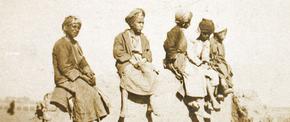The views expressed in our content reflect individual perspectives and do not represent the authoritative views of the Baha'i Faith.
Philanthropy — generated from a deep concern for the welfare and advancement of humanity — is usually manifested by a generous donation of money, time, or property. But what else could it be?
We tend to think of philanthropists as wealthy individuals who devote their substantial resources to activities that help the needy, the poor, and the sick.
RELATED: Happening Now: A Global Philanthropic Movement You Can Join
But can’t we all do that, regardless of our financial means? After all, the dictionary defines philanthropy as “a desire to help humanity.” The Baha’i teachings urge everyone to be philanthropists, simply by listening to the cries of suffering, whether close to home or in remote corners of the world, and in their hearts finding ways to respond. In The Hidden Words, Baha’u’llah wrote:
O children of dust! Tell the rich of the midnight sighing of the poor, lest heedlessness lead them into the path of destruction, and deprive them of the Tree of Wealth. To give and to be generous are attributes of Mine; well is it with him that adorneth himself with My virtues.
Since the dawn of Baha’u’llah’s revelation, this philanthropic impulse has expanded dramatically – and not just among the world’s Baha’is. Rather, a philanthropic movement as deep and wide as the ocean has come into being, impelling people from all parts of the globe to step forward to help their fellow humans. In his book The Secret of Divine Civilization, Abdu’l-Baha attributed this impulse toward philanthropy to “the grace of the Divine Religions:”
Universal benefits derive from the grace of the Divine religions, for they lead their true followers to sincerity of intent, to high purpose, to purity and spotless honor, to surpassing kindness and compassion, to the keeping of their covenants when they have covenanted, to concern for the rights of others, to liberality, to justice in every aspect of life, to humanity and philanthropy, to valor and to unflagging efforts in the service of mankind.
As one example of philanthropy, consider the Bill and Melinda Gates Foundation. As the CEO and founder of Microsoft, Gates was the wealthiest man in the world from 1995 through 2011, except in 2008 when he ranked third. His worth has reached around 40 billion dollars. In 2008, Gates announced that he would be working full-time for the Bill and Melinda Gates Foundation, which he and his wife had created a few years earlier. By any measure, the Foundation’s achievements are impressive. Known for its financial transparency, it had spent about $28 billion on charity by 2007. It deployed funds to address global problems that have often been ignored by governments, including the fight against polio, the development of agriculture to improve nutrition, providing education on the benefits of breast-feeding, and eradicating malaria. Its projects are always global in scope.
Nor is Gates alone. More and more billionaires are joining the philanthropic movement and signing on to The Giving Pledge, which began in 2010, when 40 of America’s wealthiest people initially made a commitment to give the majority of their wealth to address some of society’s most pressing problems. While originally focused on the United States, the Giving Pledge quickly saw interest from philanthropists around the world.
When asked about enlisting others in this noble cause, the investor Warren Buffet said in 2010, “In most cases we had reason to believe that the people already had an interest in philanthropy. It was a very soft sell but 40 have signed up.” Today, the Giving Pledge has enlisted more than 230 signatories from 28 countries.
This spirit of charity is not restricted to business leaders or the ultra-wealthy, either.
In 1982, former U.S. president Jimmy Carter founded a not-for-profit organization named the Carter Center. As a philanthropist, his aim has always been to promote human rights and reduce suffering. His decades of effort towards peace in the Middle East earned him the Nobel Peace Prize. Moreover, Carter has worked to improve health around the world and to reduce homelessness as a key figure in Habitat For Humanity, a worldwide organization building affordable homes for the poor.
Literally thousands of professional philanthropic organizations also work for peace, justice, and an end to poverty – all central goals of the Baha’i teachings. In just one example, Doctors Without Borders is a well-known organization of medical professionals who provide their services in war zones and natural disaster areas. In places devastated by earthquake, hurricane, tsunami, drought, or war, these doctors and nurses render free medical services, saving lives and staving off the catastrophic spread of disease.
RELATED: How Service to Others Expands the Heart
Certainly, though, philanthropy doesn’t have to involve billions of dollars, well-known figures, or international organizations. At the local level in just about every city, town, and village, people selflessly donate their experience, time, and effort to charitable organizations, the arts, hospitals, and community services. We can all become local philanthropists in this way.
In my own Baha’i community of Newmarket, north of Toronto, Ontario, community members signed up to supply meals for one day at “In from the Cold,” a community service for the homeless. Fifteen individuals, both adults and youth, volunteered to help. A few days before the event, the team bought enough food for 150 meals. Some showed up early in the morning to cook, and the cost of the food was funded by the Local Spiritual Assembly of the Baha’is of Newmarket. At meal times, more volunteers arrived at the homeless shelter to serve food. At the end of the day, about ninety guests showed up to eat, one as young as two weeks and some in their sixties. The management was impressed with the maturity, friendliness, and politeness of the Baha’i youth who provided the service. The experience was so rewarding that the Baha’i community volunteered to participate in more service activities in coming years.
Who says the sky is falling? Not according to the work of these noble souls! That’s one of the great benefits of philanthropy – while helping others, we get a wonderful window into all of the goodness in the world.As significant as their deeds are, everyone who participates in helping out with their local charitable organizations only represent a small part of a global philanthropic movement that covers humanity like a comfort blanket. Individuals, organizations, and businesses around the world have found in their hearts a place for those who need help. Like a deep and wide river, the spirit of service and charity flows onward, though it may not always grab headlines. Such deeds are the very embodiment of those spiritual attributes mentioned by Baha’u’llah in the Baha’i writings, which urge us all to “give and be generous.”
















Comments
Sign in or create an account
Continue with Googleor